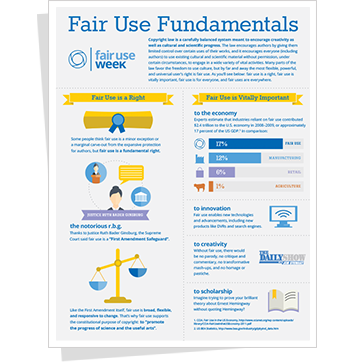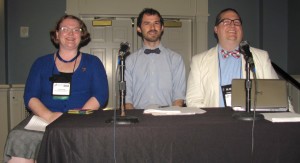Congress is finally reviewing copyright as it stands in the USA. But, according to the latest news, they are not including creators in the process. Oh, they’re involving copyright holders, yes. The ginormous companies that have inherited, bought, or had signed over the copyright to thousands upon thousands of creative works will have their say, but I doubt that these companies and agencies accurately represent the opinions and beliefs of the creators who make the products in the first place.
I’m not examining big business’ dealings with copyright; that is not my rant. At the risk of stepping into shoes way too big, I’d rather offer myself up as representative of creator and user. Ever since I started studying copyright to expand my professional skills I have become exponentially more interested in how the initial purpose of copyright has found a home within my urges to create and my drive to consume.
First of all, copyright is all about creation. It is meant to give creators enough credit and remuneration to encourage continued creativity, and it is meant to provide the public with enough access to copyrighted materials to encourage more widespread creativity. That is it, just two parties, the creator and the user, and the law. Third parties are introduced when managing copyright over a work becomes something the creator wants to farm out, and yet third parties are all we ever hear about these days.
I come from an age of pirates and I work in library services that function in very narrowly defined exceptions to copyright. I know that sharing an mp3 of the “Happy Birthday” song is actually making a copy of the digital file, not lending your CD and then getting it back from your friend (i.e. no copy made). And that copy, in the traditional print media language of US copyright law, is a violation because it has taken away the right of the creator to make money on the sale of the copy…in theory.
What I see in how I use and offer up creative products is that copyright law is completely inapplicable to a digital world. More than that, it is inapplicable to a world were easy duplication of a thing is possible for any member of the public. Copyright law is ill suited to any world with copy machines, scanners, printers, or cameras. Copyright law was formulated for a world where a town’s three rival printers/publishers fought for authors whose names would sell copy. It was created to curtail businesses from reproducing and selling work printed by a rival business, and it’s power was placed in the hands of the author. Somewhere along the line the power was turned over from the author, the creator, to the business. This is the heart of the whole problem. When power migrated to the businesses, businesses stepped between creator and user.
Creators want to get their work out there. You can see this in every art blog and online fiction site. Artists and writers regularly offer up their creations to search engines, lurkers, and devoted fans online. Creation is an act of communication between the artist and the world. Without a waiting world, there could be no communication. The most common issue I have ever seen raised by a creator on the internet about their work (or digital copies thereof) being linked, shared, transported, used, and copied by others has been in regard to attribution whether or not they have specifically adopted a rights statement that says so. I share this feeling. In fact, the only way people can find you, the artist, in the pixel polluted world of the internet is if people share your stuff and talk about you. And still the reason why I love the internet is because, should I become well known, it is the users who have chosen me. The only way the same amount of people could find me without the internet is if a publisher or agent took a liking to me and pushed my goods.
As a user, I want to make sure the creators whose stuff I love and use are encouraged to do more. I want to spread the word about how awesome they are and encourage other people to follow their progress as well. And when they sell a printed volume of stuff I have seen in excess online I want to buy it, because I am greedy, and because I want them to know that I want more out of them. I will give them money, directly, just to ensure they complete that next project (which is why we have sites like kickstarter), and I care less whether they are published through a reputable publisher.
There are people out there who abuse the openness of creativity, who take advantage of a creator’s proffered communication to the user. There always have been. This is why copyright law was created, not to regulate the interaction between creator and user but to regulate the business who plans to co-opt a creation and sell it, without the creator’s involvement or sanction, in order to compete with its business rival.
How topsy turvy are we then, that the businesses are helping our government decide how we, as creators and users, interact with each other?
Select articles:
EFF’s: “Real Copyright Reform Starts With Listening to Users, Not Just the Usual Suspects”
Tech Dirt’s: “Next Two Congressional Hearings On Copyright Reform Show The Exact Wrong Approach”



